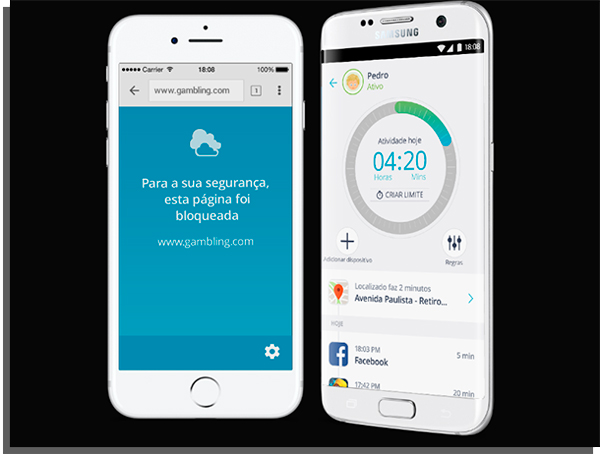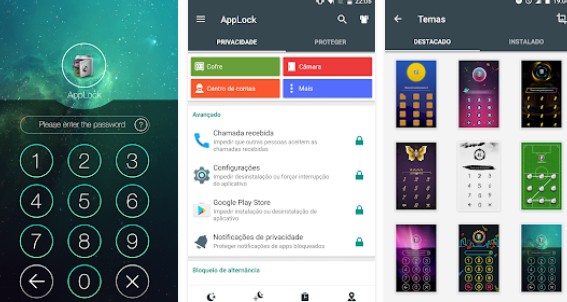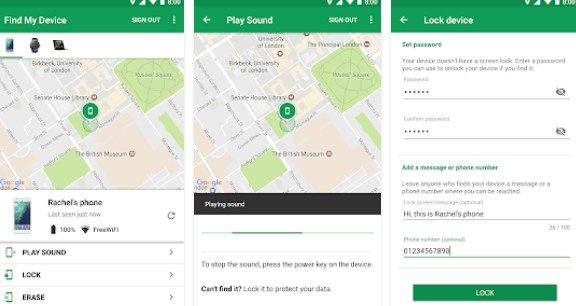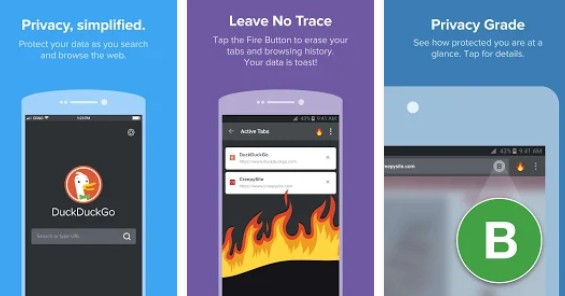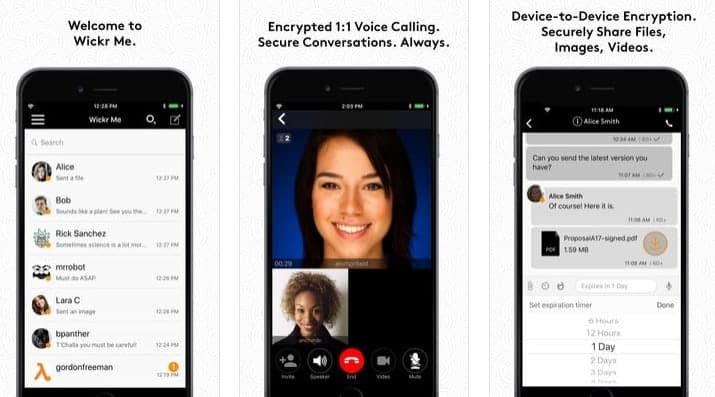Check out below 20 of the best options that you can start using right away! Read also on AppTuts: 7 things that make it easy to steal your passwords
1. Qustodio
Developed with the purpose of helping parents control their children’s access to devices such as smartphones, tablets and computers, Qustodio is one of the best security apps you can find out there. In addition to monitoring children’s activities, you can filter websites and apps that may contain adult content and it can even prevent accessing websites that try to steal data, for example. Qustodio offers its new users 30 days of free trials of the platform, which can also be used in schools and businesses. Click here to check it out!
2. Applock
One of the best solutions to restrict third party access to certain applications. Applock allows you to create a PIN code for each app on your smartphone, requiring this code to be broken in order to access it. It is quite literally a lock for applications! It is an interesting option to prevent children from accessing parts of your mobile phone you are not comfortable letting them access, or to protect information contained in a cloud storage application. Applock is free with in-app ads and is available for Android.
3. Find My iPhone
An app for iPhone, Mac and iPad, Find My iPhone is a service for tracking and remote access to your device. A standard for security apps, it can be used either to locate your lost smartphone or remotely erase all your information, very useful in case your cell phone is stolen. Click right here to check it out!
4. Find My Device (Google)
Google’s device manager changed its name and started to offer a solution similar to what we see in Find my iPhone. Find My Device is an app made by Google itself to help track, lock or erase your Android data remotely. The way it works is somewhat similar to what we see in the Apple app. Click on the link to check it out on the Google Play Store!
5. 1Password
1Password is ideal for those who have problems saving passwords on different services. 1Password allows you to generate random passwords for these services and store them for automatic login, and all you need to do is create a master password to access the app. In other words, it makes it so you don’t need to memorize several passwords, all you have to remember is single one, which will give access to all your services. 1Password is available for both Android and iPhone.
6. Dashlane
Another service whose purpose is to take the mental burden of memorizing multiple passwords. However, unlike 1Password, Dashlane does not necessarily use a master password, but instead requires the user’s fingerprints, using the iPhone’s TouchID or the biometric reader on Android devices that support the functionality. Very few security apps offer this kind of protection. It also allows its use on multiple different devices, but it charges for it. The free version only allows the use of Dashlane on one device. Click this link to download it on iPhone or download it on Android.
7. DuckDuckGo
An ideal mobile browser for those who value privacy while on the internet, this kind of security apps is rare to find! DuckDuckGo also has a search engine that does not record your search history, that is, what you search on DuckDuckGo will not appear as an advertisement on Facebook for example. However, it is worth noting that it still has its own ads, though they are only shown when viewing the app. Apart from this detail, DuckDuckGo works like any other mobile browser. It also requires greater protection measures from websites so that they appear in your searches, which means that websites shown in a browser search are usually the safest possible. DuckDuckGo can be downloaded from Google Play or the App Store.
Tip: The 9 best iPhone security tips to protect yourself from malware!
8. Avira
One of the security apps available both on Android and on iPhone that serves a more general purpose. It brings together features such as Find My iPhone, but also detects possible attempts to attack your smartphone’s stored data, in addition to optimizing the performance of the phone’s battery and memory. Avira can also detect if an email from you has been leaked and allows you to track and locate your lost cell phone.
9. Signal
One of the few instant messengers that are also strong contenders for any security apps list. Maintained by a non-profit organization that survives on donations – that is, it does not sell its information for third parties – Signal allows you to exchange messages and files with your contacts, but it protects these conversations through encryption. It also allows for voice calls and group conversations, but the data and files exchanged by the application are not stored on servers. Signal is available for iPhone and Android.
10. Resilio Sync
An app that must be used in conjunction with a computer. On your desktop or notebook, Resilio Sync creates a kind of “cloud server”, but it can only be accessed locally and is actually stored on your computer. On your mobile, you open the app and sync your files between both devices. It’s like a backup of your phone on your PC. The difference to an ordinary cloud storage service is that you know where your files are physically stored. Resilio Sync can be used on both PC and Mac, as well as Android and iPhone versions.
11. Lookout
Another belonging to the wide category of security apps with more general functions, Lookout is an antivirus available for Android and iPhone. It lets you track your phone, blocks attacks that can be carried out over public Wi-Fi connections, backs up your data, and alerts you when an app is out of date, among others.
12. Duo Mobile
A service that allows you to add a two-step authenticator to services and apps that don’t have the feature natively. In other words, if you are more comfortable accessing a social network with two-step authentication, you can use Duo Mobile to create this type of secure access, preventing third parties from accessing it remotely. Duo Mobile can be downloaded from Google Play or App Store.
13. Firefox Focus
An alternative version of Firefox aimed at private browsing. Similar to DuckDuckGo, it allows you to always browse in “private mode”, meaning it doesn’t track your history to show ads, deletes web crawler activity and doesn’t keep a browsing history for long, a common feature in security apps. Firefox Focus is free and can be installed on Android or iPhone.
14. Wickr
Another private messenger, Wickr is also offers encryption that protects your text and voice conversations, making it safer to handle sensitive information. As with Signal, Wickr also allows the creation of group chats, and it is not necessary to provide your email or telephone number to register for the service. Wickr allows you to set in how long it takes for messages to get auto-deleted, and also the metadata is not stored on external servers. Download Wickr from Android’s Google Play Store or iPhone and iPad AppStore.
15. Proton Mail
Unlike Signal and Wrick, Proton Mail is one of the few security apps focused exclusively on email. The app also features encryption to protect all sent and received messages done by email, making it difficult for third parties to intercept them. Your email storage is also encrypted, meaning that not even Proton Mail staff has access to your messages. It’s worth noting that it’s also completely free and can be used on both iPhone and Android.
16. Kaspersky Safe Kids
One of the best security apps dedicated to parental control. In other words, its specialty is to protect children from inappropriate content on mobile phones. Kaspersky Safe Kids has a paid and free version, providing blocking of inappropriate websites, safe search and creating a list of blocked websites for your children. The paid version brings more monitoring activities, allowing you to know the location of children and monitor their internet activity through reports. It’s also not an easy app to be deleted by kids. Kaspersky Safe Kids can be downloaded from Google Play or App Store.
17. Glasswire
One of the security apps aimed at internal monitoring of your device. Glasswire shows reports of your phone’s data usage, revealing which apps are using the most internet data on your phone. That way, you can find out if some app that shouldn’t take so much data might be being used for shady activities. Click on the link to download Glasswire for your Android.
18. LastPass
1Password’s main competitor among security apps that allow you to store passwords. With similar functionality to its rival, LastPass allows you to create a master password to automatically log in to your favorite services. It also lets you generate your own passwords, and is a free application, with a paid version that costs a single dollar. LastPass is also available on Android or iPhone.
19. NoteLock
One of those security apps with very specific purposes. NoteLock is solely to protect your notes or journal entries, if there are any. In addition to being able to save what you wrote through passwords or combinations, NoteLock has a feature called “bait mode”, in which it delivers automatic notes created by the app itself as if they were yours, protecting the real content. Tap the link to download it to your iPhone or iPad.
20. NordVPN
This app is ideal for circumventing restrictions imposed by local internet – like a service that is not available in your country. NordVPN is one of the best in the field, allowing you to mask your access as if you came from one of the 60 different countries offered by the app. It is also possible to block ads and protect your phone when connected to a public Wi-Fi, making hackers’ attempts to break in difficult. NordVPN is a subscription app, but offers 7 days of free trial. The app can be used on both iPhone and Android.
Do you use any security apps on your mobile phone?
Now that we suggested a good deal of apps to protect your passwords, monitor access and browse without ads, it is your turn to give us your recommendations! What security apps do you use on your Android or iPhone?
